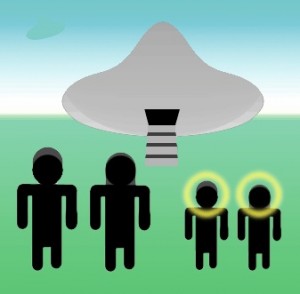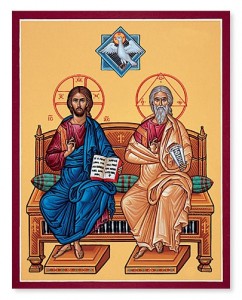Feb 11
23
The Process of Becoming
The title of this piece comes out of focusing on a chapter in the book I am in the middle of writing. The book’s title (so far) is:
Beyond What to Whom …Bypassing the Final Obstacle
The following is excerpted verbatim from a chapter entitled, “Too Much Too Soon?”
Based on some comments in recent e-mails, jumping right into “I AM consciousness,” without providing just a bit of review was more than just a giant step …it was a leap into an arena for which some have not been adequately prepared. So how do we avoid losing people who are fast-tracking and, at the same time avoid losing those who need an intellectual bridge?
The answer I received is to make the review fresh and interesting. Okay, Dad, I need help for that one. Whoa! The glimpse I just “saw” is exciting!
The bridge for many will be to not only understand the transition from one of being a son (no gender in the kingdom of which our SPIRIT-PARENT is Leader and Teacher), to that of ONENESS with the SOURCE. I am transcribing this as I get it and the fun of this is I have no idea yet how we are going to learn the bridge together.
In other words “I see it,” but don’t know how to articulate it yet. First of all I am supposed to explain why I use “SOURCE” in place of what many would be far more comfortable if I used the term, “God.”
Here we go: “In the beginning was the Word.” –John 1:1– We have no idea of the extent of utter ridiculousness of modern translators to continue the tradition begun in the King James Version (KJV) of the Bible, to use this term, “The Word.”
What I am about to say is not easy to follow, because of the confusion perpetuated by the use of this term, again, “The Word.” In the original language the term literally means, “The complete expression of” – in the Amplified Bible the translators followed the term with the word “Christ” in parenthesis (Christ).
In other words, at least this one relatively modern and widely respected translation saw the need to explain the meaning of the term “Word” as “Christ” …another word which means way too many different things to way too many different people to convey anything that makes sense to anyone.
Okay, so we go back to, “In the beginning was the Word and the Word was with God and the Word was God.” Remember, now, the term “Word” in the original language (here in English characters) Logos meant and means “the complete expression of” and the next term, of course, is the three letter English word “God.”
Now then, dear readers, we have a huge challenge. The writer of this passage generally accepted to be John, one of the twelve disciples closest to Jesus, a Jew, who, as did Jesus, spoke Aramaic, a derivative of Hebrew, but was writing the “Gospel of John” to an audience comprised of those who spoke and read Greek.
What I am developing here is what I was shown by direct revelation. I suggest you go to the SOURCE and confirm it for yourself; also please remember this is to explain why I use “The SOURCE” instead of “God.”
Here is what I have been shown, and confirmed by enough of those who actually are expert (I make no such claim) in Greek and Hebrew. The challenge to us in this “post modern” age –yet another confusing term– is that John is obviously attempting to convey, in Greek, what was written in Hebrew in the first chapter of Genesis, and help his audience understand something that is incomprehensible in the Greek because the Hebrew term cannot be translated into Greek and here is where things should become clear (but only if you are willing to demand that the SOURCE make them clear); IT IS ALSO IMPOSSIBLE TO TRANSLATE THIS SAME TERM INTO ENGLISH.
Why this is true should give any reasonable person pause and it has to do with two distinct translational difficulties, one of which is cultural and the other linguistic. In both Greek and in English the Hebraic term (here in English characters) Elohiym, pronounced (more or less) A (long “a” as in say or hay) LO HEE YIM cannot (it is impossible to) be translated into either Greek or English.
Now, remember, John wrote in the Greek language attempting to explain not only who Jesus was before he became a man, but also explain Elohiym.
Elohiym is a plural word which means “the many spirit beings that constitute the supreme Being which the Greek language refers to (here in English characters) as, “Theos,” (pronounced, more or less thay-oce …the second syllable rhymes with dose) and in English, “God.”
Here is an exercise that will help anyone who really wants to understand why it is impossible to translate the plural Hebrew term, again, “Elohiym” into the singular “God” or “Theos:” Ask any English speaking person and especially any Evangelical Christian to explain what the term “God” means to them. The answer you get will almost always boil down to the one (singular), and only one, Supreme Being, comprised of three persons (the Trinity), that is, the “Father, Son and Holy Spirit.
A man, formerly a Rabbi, in what is commonly referred to as “Orthodox Judaism” who also happened to accept the Trinity and had become a leader in the Evangelical Christian movement called “Jews for Jesus” told me, in no uncertain terms, and in authoritative New York Jewish accent and fashion, that while the Trinity could easily fit into “Elohiym” …in no way can Elohiym be limited to the Trinity because Elohiym represents many spirit parts not merely three.
I just now realized something about the Trinity that I never before had given any thought. The “Son” refers to Jesus the human being (“in the flesh” and, therefore, not a “spirit” at least in the usual connotation of the term. Which to me sheds a great deal of light as to why the distinction made by this former Rabbi so important.
If I haven’t lost everyone by now, back to John 1:1. Just as with this former Jewish Rabbi, the writer, John, a Jew, well versed in the Hebrew explanation of “the beginning” portrayed in the first chapter of Genesis, who was also convinced of the Messianic claims of Jesus, is attempting to explain the inexplicable:
“In the beginning was the Word, and the Word was with God, and was God.”
That certainly clears everything up, right? Moving right along, John then says: “He” (the Word, remember) “was with God in the beginning and everything was made by Him” (again, Him” is making reference to this “Word”) “and through Him.”
Then John gets into a side bar of cryptic seeming stuff about John the Baptist and what he proclaimed about Jesus …and then we come to this bombshell: The “Word” became the man Jesus! Holy mackerel!
While I was speaking in an Evangelical church (as of this writing, I no longer accept such invitations) several years ago, I asked, “what should I say?” and heard a voice speaking so loudly I actually thought, for a moment, that the entire congregation must have heard it …”Ask them who I am” …I stepped down off the platform and began asking several individuals among those seated, “who is Jesus Christ?” The two most pronounced answers were, “God” and “Son of God” I pointed asked each person what they meant by “Son of God” …and saw nothing but blank stares. I finally read John 1: 14 aloud, in which John says that the “Word became flesh” (Jesus) and said basically that Jesus was the Creator of the Universe “the Word” before he became a human being …and at that moment realized a challenge that I couldn’t adequately express. The man, Jesus, did not create anything. The creative SPIRIT part of SOURCE did.
I then asked, “Where is Jesus right now?” The prevalent answer was, “at the right hand of God.”
I then read aloud two passages which make the declaration that “Jesus Christ is in you” and practically yelled, “Unless you understand who Jesus was before he became a man and know where he is right now, you are going to be sitting in pews powerless to do anything that he promised you would do if you believe enough.”
You see, “God” simply doesn’t convey the intent of the original. Now then, who is this “Word?” Here’s the clear revelation: This “Word” is the Creative Spirit part of Elohiym through whom and for whom everything was created and which I choose to call “SOURCE” and because of Jesus’ introduction with an intimate Aramaic term that can only be reasonably translated into English as “Daddy,” (“Father” is far too formal to convey the intimacy of the original language) …and because Jesus also clearly stated that there was no gender in the spirit realm… the male image of Father doesn’t convey the truth that the SPIRIT-PARENT SOURCE can be referred to just as legitimately and accurately as a “HER” or even IT …and “Mommy” is just as appropriate as “Daddy.”
All the foregoing doesn’t translate into anything, unless we also grasp the reality of Jesus’ words about us which was also conveyed by his disciple, John, who said, basically, after stating that everything was created by the same SPIRIT who became the man, that all those who receive Him (referring to this “Word” who became Jesus) would also have the power and authority to become joint heirs with this whom the writers of other Gospel accounts referred to as the firstborn among many “sons” of God.
Therefore, this is not about becoming like Jesus in the sense of trying humanly to copy him, but rather becoming endowed from, by and with our SPIRIT-PARENT to not merely be children, but to BE in unity as one with HER/HIM/IT.
Now then, with all the above, this cannot be intellectually absorbed, but rather spiritually infused. The only thing that I can say about the process of becoming is the same thing Jesus said, that is, if we knock and demand UNTIL we get it, we then are in a position to declare it and, therefore, further the process of becoming. Podcast 59 February 23 2011 The Process of Becoming
In Freedom,
Brad





